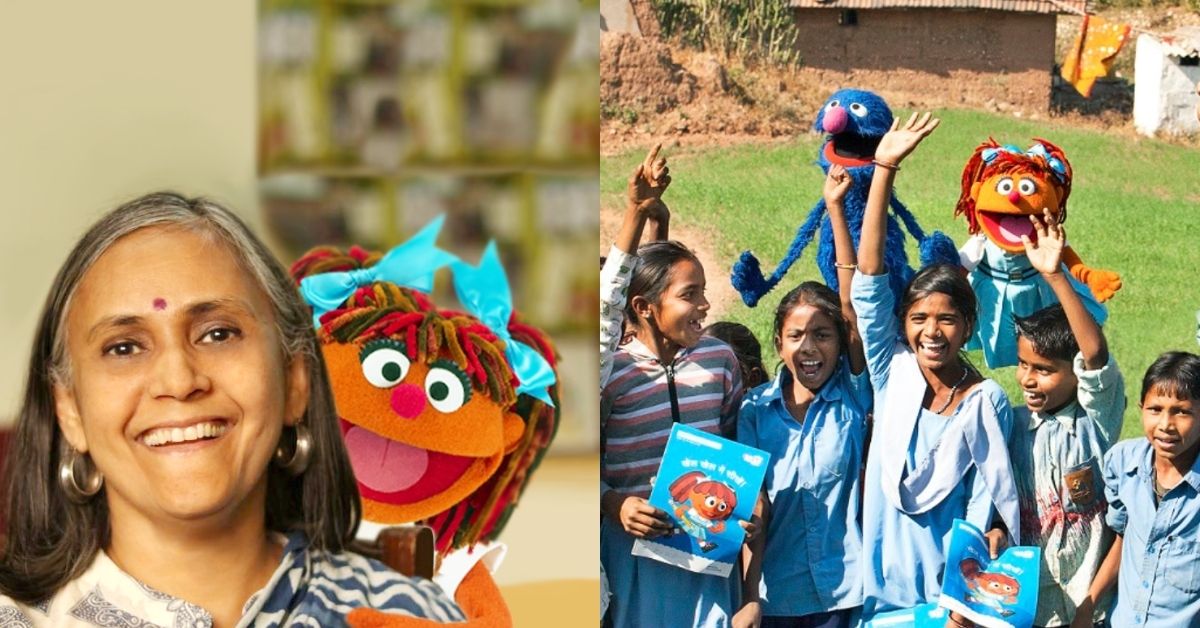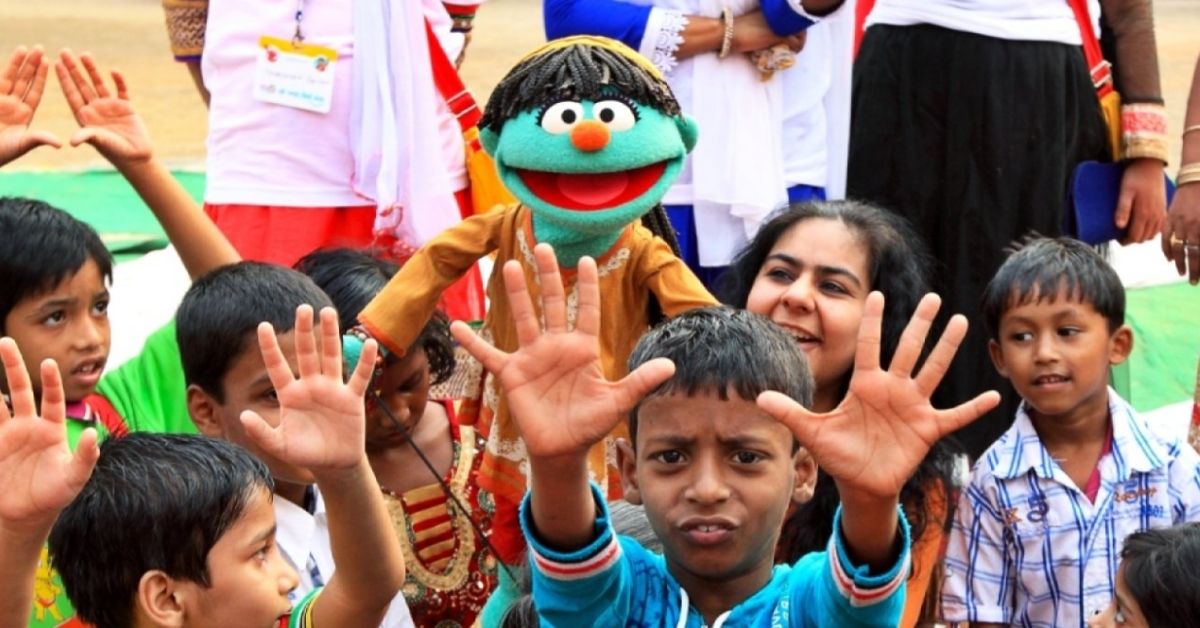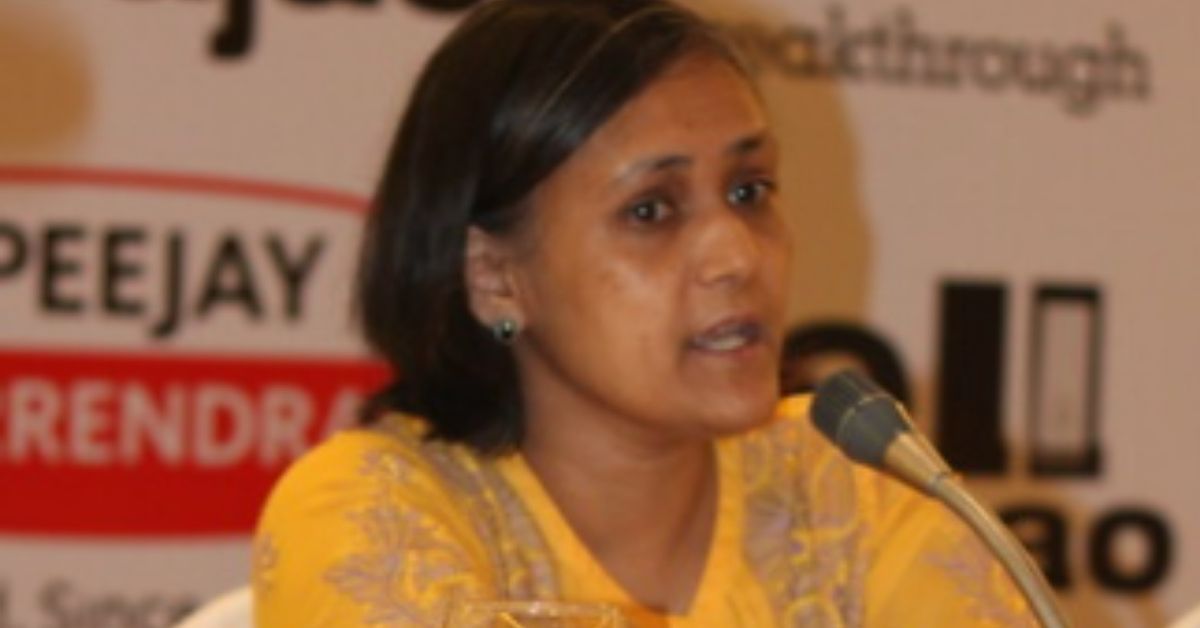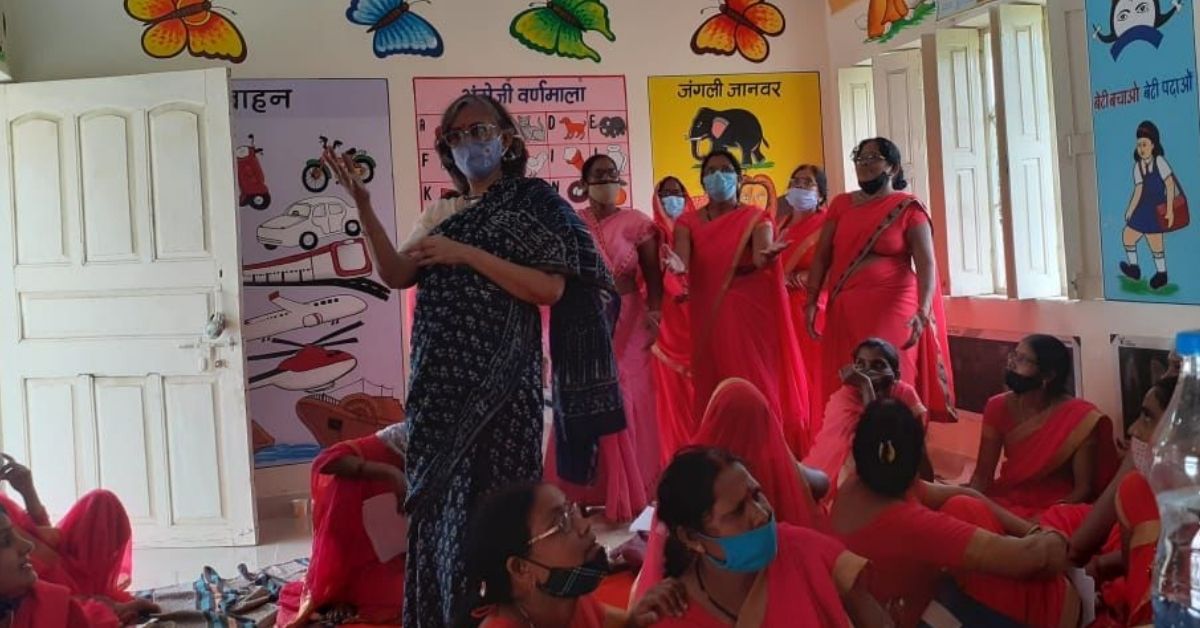Journalist Quits Career, Dedicates 20 Years To Uplift Millions Of Children & Women
Sonali Khan is the managing director of Sesame Workshop India, whose most famous programme Galli Galli Sim Sim is watched by millions of children across the country. Here’s why she decided to quit a thriving journalism career to work in women and child development.

The first award that human rights activist Sonali Khan ever received was a certificate that declared she was “a helpful child”, while she was in school.
“I was disappointed,” she laughs, recalling the incident in conversation with The Better India. “Everyone else was getting all these cool certificates, and I had ‘helpful child’. I couldn’t understand what was so great about that.”
But over the years, that certificate has come to hold a lot more significance, she says. “With the work I do now, ‘help’ is a wide term – it’s empowerment, it’s to build a future India, especially by working with children. It’s about going out of your way to give something back.”
In 2018, Sonali joined Sesame Workshop – India, which is part of the American non-profit Sesame Workshop, an organisation that has produced several educational children’s programmes. Its first and best-known programme was Sesame Street, which is better known in India as Galli Galli Sim Sim and is watched by more than 150 million children across the nation.

As managing director of the organisation, Sonali leads the Galli Galli Sim Sim project, which aims to combine the abilities of mass media with educational outreach. Under her guidance, Sesame develops and implements numerous initiatives and programmes to work with kids.
Before her tryst with Sesame began, Sonali was already a well-known human rights advocate. She was the director of knowledge creation and dissemination at Dasra, a philanthropic foundation where she worked for urban sanitation, adolescent girls’ rights, and democracy and access to justice. Before Dasra, she was vice-president and later country director of Breakthrough India.
But even before engaging in grassroots development, Sonali was a young television journalist in the 90s. “It was an exciting time for India’s economy,” she recalls. “The landscape of all sectors was changing, and the economy was extremely vibrant. All the changes we see today in product design, television and the like were happening in those times.”
When life has other plans
Soon after completing her post-grad political science degree from Jawaharlal Nehru University, Sonali joined TV18, after a friend informed her that the organisation was looking for people to write scripts. Here, she learned the ropes of visual media and human interest stories under Indian businessman Raghav Bahl. “I’d never studied communications, but I learned on the go,” she explains.
She worked for StarTV researching storylines, working in partnership with technical folks to produce content.
In the early 2000s, when Sonali had her first child, it became difficult to manage her life at home with a busy career in journalism. By this time, she had moved to freelancing, including working with journalist Saeed Naqvi. Soon, she had her second kid, which is when a friend told her that feminist human rights NGO CREA was looking for a communications person.
“I was aware of the domain in general, but I’d never worked in it directly,” Sonali says. “I decided to give it a shot anyway, since it was a technical role. I’d always planned to come back to journalism. But when I started working in the non-profit sector, there was no looking back.”

Soon after CREA, Sonali joined Breakthrough India. Here, she worked on issues like early marriages, domestic violence, sexual harassment, and other issues under the umbrella of women’s rights. “It was 2006 or so, and we were speaking about some unconventional topics at the time – like the importance of men using condoms. We had to engage larger and larger populations, and not just talk in a bubble,” she recalls.
With Breakthrough, Sonali ran the international Bell Bajao! campaign against domestic violence, alongside What Kind Of Man Are You? to encourage men to wear condoms for HIV/AIDS prevention. “These were all driven by the approach to build awareness and change social norms. They were media campaigns coupled with in-community interventions, in areas like UP, Bihar, Jharkhand and Haryana.” She also spearheaded the organisation’s Mission Hazaar to stop gender-based sex selection.
Her brush with working with children came when she began working on more and more projects on early marriage, where she says the incidents of domestic violence tend to be higher. “The girls don’t have any agency, and when they become pregnant, cases of violence emerge,” she explains. “We explored and analysed the data to open conversations around adolescents’ rights. We need to look at early marriage as not just ‘child’ marriage to include 16 or 17-year-olds as well.”
Engaging millions
Sonali would work with Breakthrough India till 2018, where the campaigns she led went on to reach and impact millions across the country. What Kind Of Man Are You? heightened awareness around HIV for 2 million PLHIV, and the PSAs under Bell Bajao! reached 130 million.
After this, she moved to Dasra. “The organisation aimed to use philanthropy to bring systemic change, rather than lead localised projects. For example, rather than just give books and bags to children, the idea was to make sure of things like girls staying in school, and create projects to bring long-term changes.” Here she led the Ab Meri Baari campaign, which worked for adolescent girls’ rights to amplify issues such as education, sexual and reproductive health, and early marriage. The campaign reached 26 million people, as per Dasra’s website.
After a brief stint with Dasra, at the end of 2018 she moved on to Sesame Workshop – India. “We work on using television to reach children,” she explains. “Working with children was a new experience, but exciting nonetheless.”

“Does education mean only the alphabet? Or does it encompass holistic child development? Where are you aligning core skills? These are some of the questions we look at,” she explains. “Since the Indian education system has many gaps and challenges – it is rote based, there’s a focus on numeracy and literacy – we have to change the metrics of success. Skill-based systems are equally important – executive, creative, thinking, problem-solving, etc. And then we look at how we can sensitise curricula, involving a gender lens to make sure boys and girls don’t end up thinking that one gender is superior to the other.”
Sonali says Sesame works with Anganwaadi and government schools to look at these aspects. “We also look at parenting, and understand how social-emotional wellbeing needs precedence,” she says.
Programmes include offering home-based learning to 90,000 children across nine Indian states to help them catch up for the next academic year, given that many have missed out on education due to the pandemic. They also have a COVID-19 care programme using the characters of Galli Galli Sim Sim to “prepare children for a new normal”. These include infographics, videos, e-books and activity sheets, and audio to teach kids about physical distancing, maintain hygiene, engage parents in caregiving, encourage online learning, how to take care of their mental health, and more. The organisation also leads programmes on nutrition, gender equity, early education and so on.
“We aim to reach a large audience with critical lessons and information, both parent as well as child facing,” she explains.
Coming to some gaps at household levels, Sonali notes, “In a country like India, parents play with children only till they’re one or two years old. Then they move on to discipline and education. With many of the parents we work with, there’s generational poverty, limited literacy, and the like. They don’t have the tools to play and engage with their kids. So we try to cover those gaps.”
Sonali says their programmes are in multiple languages including southern and eastern languages, as well as Kashmiri, and the organisation has also introduced programmes in Khasi and Garo. “Projects on-ground are across Uttar Pradesh, Orissa, Rajasthan, Gujarat, Meghalaya, and many more,” she notes.
From ‘helpful child’ to international recognition
Over Sonali’s 20-year career trajectory, she has worked on several issues. As a woman taking on such sensitive issues, what are some challenges she has faced? “There’s so many layers to this. For one, there’s a lack of funding when it comes to women’s organisations, so carrying on work is difficult. One of the biggest struggles has been to get resources. People ask, ‘Are you running a care home or a service?’ And when you say you’re trying to engage with social issues, they’re dumbfounded, because there’s a lack of understanding as to why we need to run these programmes in the first place.”
She adds, “How do you measure success in such issues? What are direct indicators of an increase in women’s agency, gender transformation and such? It’s a catch-22 situation because they won’t give you money till you have proof, and they won’t give you money to create the proof. So if I need Rs 10 lakh, I might actually get Rs 50,000.”
“Of course, you also get labelled as a ‘mad woman’ on a rampage to ‘destroy the fabric of society’,” she says. “When I started, there weren’t too many voices around social and behavioural changes. Today it’s funded, there’s a community, there’s pedagogy — it took us 15 years to get here.”
For her work over two decades, Sonali has received the Nari Shakti Puraskar from the President of India, alongside the Skoll Award for Social Entrepreneurship for her work in ending child marriage.
“I was in a sort of daze that day in the Rashtrapati Bhavan as I stood before former president Pranab Mukherjee,” she recalls. “It was humbling to be in those halls, where some of India’s most important figures have walked, where history itself has played out. Skoll recognised me as a social entrepreneur, which was a fascinating term. Those were moments in which I was able to say, ‘Wow, this is new. I never thought I’d be recognised this way for the work I’m doing.’.”
She adds, “On a personal level, the journey has been very significant. It was wonderful to speak to a multitude of people, hearing how the programmes inspired them to take personal action and responsibility. It all seemed worth it. Watching young girls triumph, become leaders, bring in changes – it revs up your engines, pushes you to go that extra mile.”
“Maybe the returns would be higher if I’d have moved to the corporate sector, or stayed in television journalism. But in a way, to be able to give a lot of yourself to those who need it is equally rewarding,” Sonali notes.
Edited by Yoshita Rao
Sources:
Punekar news
Sesameworkshopindia.org
Study by endvawnow.org
Breakthrough India
If you found our stories insightful, informative, or even just enjoyable, we invite you to consider making a voluntary payment to support the work we do at The Better India. Your contribution helps us continue producing quality content that educates, inspires, and drives positive change.
Choose one of the payment options below for your contribution-
By paying for the stories you value, you directly contribute to sustaining our efforts focused on making a difference in the world. Together, let’s ensure that impactful stories continue to be told and shared, enriching lives and communities alike.
Thank you for your support. Here are some frequently asked questions you might find helpful to know why you are contributing?


This story made me
-
97
-
121
-
89
-
167













